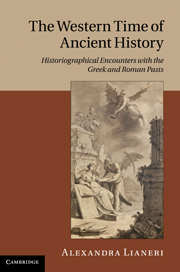Book contents
- Frontmatter
- Contents
- Acknowledgements
- Notes on contributors
- INTRODUCTION
- THEORISING WESTERN TIME: CONCEPTS AND MODELS
- ANCIENT HISTORY AND MODERN TEMPORALITIES
- UNFOUNDING TIME IN AND THROUGH ANCIENT HISTORICAL THOUGHT
- AFTERWORD
- 14 Ancient history in the eighteenth century
- 15 Seeing in and through time
- Bibliography
- Index
15 - Seeing in and through time
from AFTERWORD
Published online by Cambridge University Press: 03 May 2011
- Frontmatter
- Contents
- Acknowledgements
- Notes on contributors
- INTRODUCTION
- THEORISING WESTERN TIME: CONCEPTS AND MODELS
- ANCIENT HISTORY AND MODERN TEMPORALITIES
- UNFOUNDING TIME IN AND THROUGH ANCIENT HISTORICAL THOUGHT
- AFTERWORD
- 14 Ancient history in the eighteenth century
- 15 Seeing in and through time
- Bibliography
- Index
Summary
What has history to do with me? Mine is the first and only world.
Ludwig WittgensteinOnce they choose to reflect on their lives at all, human beings have no alternative but to conceive and imagine them in the dimension of time. Time is the frame of all agency and the shifting horizon of hope and fear through which every conscious being moves. The most dramatic projects for escaping its sway organise themselves by necessity through attempts to negate it or defy its implications, and re-enact its relentless authority as they do so. As a literary genre, in all its heterogeneity, history sets itself to present consequential aspects of the past as they were, and capture and convey their significance to an audience in the present and future. Within the intellectual tradition of the west two canonical renderings of history, classical and Christian, have furnished the principal paradigms for identifying and conveying that significance, effectively obliterating all those that preceded them, and framing much of the imaginative history of Europe as they passed along their way. It has been the cumulative experience of reflecting on each of them which has done most to define the sense of history within which Europeans have lived for well over a millennium. As Alexandra Lianeri's rich collection shows, intellectual resources generated elsewhere, whether earlier or in more recent times, have still done remarkably little to shake the intellectual hegemony of visions of time and its meaning for human life which emerged from and continue to centre on these two great domains of experience.
- Type
- Chapter
- Information
- The Western Time of Ancient HistoryHistoriographical Encounters with the Greek and Roman Pasts, pp. 307 - 314Publisher: Cambridge University PressPrint publication year: 2011
- 1
- Cited by

